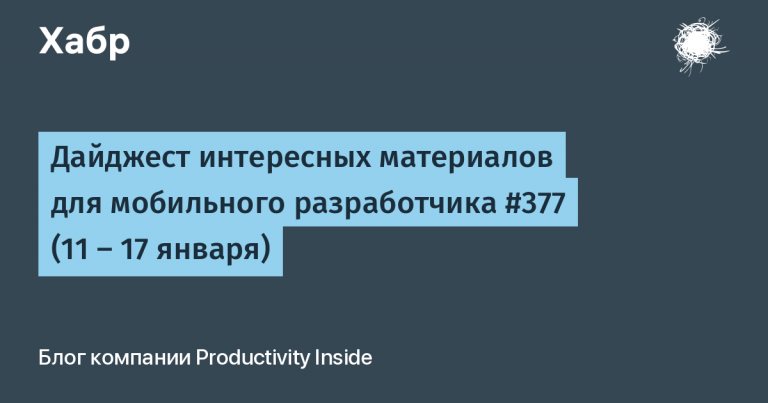Login to IT. How do young specialists live in public medical institutions?
In this article I would like to talk about my experience and highlight the topic of working conditions for a young man in the industry. In addition, describe the situation of workers in government agencies in principle.
1. They don’t speak badly about “their own people.”
For six months I worked as a programmer with the responsibilities of a system administrator in a medical institution. First, I would like to show how I interacted with my superiors and what kind of atmosphere reigned within the organization. On one of the first days of work, the chief physician’s secretary came to me and demanded that I delete a comment on the social network. At that very moment I learned that we have a social network account. Is this really my responsibility? Apparently, if you yell at me hard enough, it will instantly be written down in the contract. And it seems like the secretary is not my direct boss, why should I even listen to him? We even have a special person who was appointed responsible for posts on social networks and pages, he manages them. Why can't he clean up the comments himself? Nothing is clear, but that’s the way it is here.
In an unsolicited comment, as in a formal letter, the patient dared to express dissatisfaction with the service received. An official letter cannot be deleted, and a lawyer had to handle the unsubscribe. Well, the logic “comment – social network – computer – programmer” led to me.
Why do social media comments have to be perfect? There is an assumption that the head physician monitors his reputation because he works under a contract with the Ministry of Health. And it would be nice to have perfect reviews so that the contract is renewed.
2. ALL INCLUSIVE
You can already understand that working in government agencies is not easy and has its own charm that needs to be understood and accepted. What is it? In the nuances of understanding who a programmer is and what he does in the workplace. In short, there is absolutely none. No one is interested in the fact that the employment contract stipulates the obligation to create programs for the needs of the organization. After all, everyone already knows what a “tyzhprogrammer” should do:
carry a bottle of water to the cooler, because you are the only man;
carry the TV and install it on the bracket;
make reports for the ministry, because they are done in SAIL (accounting software), which is located on the computer;
enter data on the site;
monitor the performance of the site;
connect all important people to a group video chat every time they need it, because they themselves do not know how and do not want to learn;
change cartridges for everyone at his first call;
restart your PC because Word is frozen;
fix a microwave, because the programmer understands everything.
Absolutely every employee believes that the programmer is specifically obliged to help him, because the programmer knows everything. Everyone silently agreed with this.
It also happened: one day a doctor asked me to download a video from Youtube so that my son could show it at school. “Tyzhprogrammer”, yeah.
And, of course, you need to do all the necessary work to automate, implement and support the process of paid services, the unofficial bosses receive a percentage of the payment.
And all this is included in the salary of 17k. To be fair, I note that they can give a bonus of 10-15k.
3. Money pays for reports.
Then you can touch on deeper topics. It is no secret that medicine is increasingly focused not on the patient, but on reporting and documentation. No report – no funding, so all the patients later. Paper tends to burn, but electronic versions of documents can be accumulated in databases and admired throughout Moscow, and then reported up the hierarchy. It’s convenient, and you can manage your budget or even earn a promotion. As in business, everything is tied to money, and even a budgetary government organization first of all thinks about making money. So, how to organize financing when switching to electronic documents?
The compulsory medical insurance system, which is used by the vast majority of medical institutions, requires payment based on the volume of work. All doctors of medical institutions are forced to work in the MIS (Medical Information System). In it, the doctor fills out a template created specifically for a specific profile of the institution, signs it with an electronic signature and sends it to the federal register. Funding is awarded for each such document.
But the document needs to go through a number of checks before it is taken into account and paid for. First, the doctor fills out an examination template in the MIS, which is supported by a private organization. Laboratory research takes place in the LIS (Laboratory Information System), which is supervised by another private organization. Laboratory research from LIS is integrated into MIS. Then the documents are sent to MIAC (Medical Information and Analytical Center), which accumulates this data and checks it with federal requirements (in fact, no). And in the end, the document is forwarded to the federal registry.
If there is a discrepancy anywhere in this chain, the medical organization simply will not receive the money. As a result, everyone is trying to “put things in order” in the documents. Mistakes are still not uncommon, and for mistakes, a programmer or, at worst, a doctor is appointed as the last one.
During these transformations, one simple idea is introduced to employees: documents are the main thing, and no one cares about what happens to the patient.
Money for reports leads to the fact that documents can be prepared without the provision of appropriate services. One day, a nurse with whom we actively interacted found several records in her patient’s personal account that she had been receiving services for examining pregnant women for six months. There, in my personal account, I even found a sick leave note (!) for pregnancy. The nurse herself, at 45 years old, did not even suspect future happiness. Bible story! Immaculate Conception! Miracle! It’s just a pity that a call to the same clinic, which was inspired by the classics of world culture, seriously spoiled plans for childbirth and subsequent ascension. The incident was attributed to a glitch in the system. Do we believe?
4. Devaluation of labor results
Here we gradually get to some very interesting things. The chaos and lack of understanding of how this whole system works begins to weigh on you, and the feeling that you have influence on events in this story disappears. In some branches of philosophy this is called alienation from the results of labor. As a clear example, we can present the experience of implementing domestic software, namely the Astra Linux OS.
Somewhere in October, another piece of paper arrived in the mail from the regional authorities, which presented a fait accompli: switch to an import-substituted OS and abandon Windows. Group license issued to the ministry. We will upload an image of the licensed version to the cloud next week. In the meantime, knock out his personal email from each employee; scheduled training on working with the OS will be held in November.
An official letter arrives demanding that you provide mail. The deadline was set on November 30, that is, a whole month for this matter. Since I have a lot of time, I lazily created a Google Doc and asked all the staff to share the mail, which I can shake out in just a month. And suddenly the exact same letter arrives demanding that employees be provided with email for training to work in Astra Linux, but the date is already October 30, that is, today. It’s very good that I at least informed everyone in advance. With kicks from the head physician, I managed to complete the task, but the lesson was indicative.
Then I sat down to master the new system. The organization has its own network, its own secure VPN, a crypto provider with crypto plugins for the browser, as well as various specialized software created for medical devices. How to install all this on Linux? What if this software simply doesn’t exist for Linux?
I addressed these questions to the ministry, and they gave me an honest answer: “We can’t say anything, but if there is no special software for Linux, then you can use Windows. Also, since the license for Astra Linux belongs only to the ministry, you are not entitled to technical support from the developer. If you want, buy it yourself.”
I am far from a professional in Linux, and it took me a month to overcome simply setting up a network. Astra has a built-in network manager, but it works only occasionally. Reading the official documentation from the developer did not give anything, because already at the first stage of launching the program it freezes. Welcome to the good old forums.
December has come, the ministry reports that they would like to see at least 10% of the fleet transferred to a new OS every month (what if nothing works on it?). The training will not be provided by the official Astra Linux developer, but by a private organization that specializes in online courses.
What does this mean? And the fact is that users will not learn anything, even in theory, because the third-party organization is not interested in the learning results. In addition, they are unlikely to answer my questions about the functionality of the software, because all this is needed solely for reporting to senior management. All these games with collecting mail and training were fiction from the very beginning. The real user training will be done by people on the ground, like me. And everything would be fine, but in addition to this, it is necessary to satisfy the momentary desires of everyone around, and set up a new system in the breaks between them.
5. FAP
Other colleagues share interesting situations. The most illustrative case is the case of paramedic and midwife stations.
According to a project from Moscow, the region was allocated funds for the construction of medical assistant stations in rural areas. As usual, everything was done on time, they work great, the reports are full of achievements and innovations. However, for some reason, documents about medical procedures performed from these points are not included in the federal register. And here, gentlemen, the bosses begin to get nervous, and at the local level among our colleagues it is revealed that there is simply no staff at the FAPs. There are no paramedics who are willing to work there. Low pay? Remoteness from the benefits of civilization? Quite possible. In addition to this, some of the FAPs were destroyed as a result of shelling, as they are located near the border. However, in the struggle for their cozy chair, directors, deputies and ministers come up with various sophisticated ways just to report on the work of these points. Two options were proposed: someone goes there in armored cars (and there were such, both armored cars and people) and do what needs to be done there, the second – programmers of medical organizations register some medical workers there and themselves create SEMDs (structured electronic medical document ) on their behalf. They enter the patient's surname, the surname of the health worker, make a diagnosis (?), prescribe treatment (???), conduct an examination, put the signature of a non-existent health worker and medical organization under it and send all this beauty to Muscovites to see. It would be interesting to read comments from cybersecurity experts and lawyers on this matter.
6. Reaction of colleagues in misfortune
“Special” working conditions force people to organize and help each other, in connection with this, once upon a time a general chat was created on Telegram for 100 people, its participants being fellow sufferers in the region. One day they decided to appeal to higher authorities with a request to finally put an end to this mess. About 50 people signed the appeal. They asked to simplify bureaucratic procedures and finally increase salaries. The main problems are low salaries, turnover and wild chaos. To the point that a person resigns from the ministry and work in an entire area simply disappears. In turn, the ministry, through official letters, is trying to make us look like extreme people. The initiators of the appeal were fired and were not hired anywhere else. Why? It’s just that the Ministry of Health will have questions about why the head physician hired such a person. The story is over. Everything is good in reports and conferences, indicators are growing, money is being spent. And the patients, most importantly, are “treated.”
Conclusion
Of course, such an experience did not pass without a trace. When I first got settled, I was filled with enthusiasm. I went from office to office and helped everyone who asked for anything. I have introduced innovations that make my work easier and prevent various problems associated with working in an MIS. I trained staff to work in it, and also helped organize the work of the institution around electronic documents. However, systematic evasion from direct answers, incompetence, appropriation of work results by high ranks (to the point that on an official letter that only I wrote, my name is crossed out and the manager’s name is written), the inability to radically influence the process and low wages simply burn out all emotions. It becomes impossible to work at the same pace. After a while, I stopped understanding where I was and why I was doing all this, and all this madness became commonplace. It is extremely difficult to work in such conditions. There are many like me. There are no prospects for improving working conditions and the quality of services – and there will not be until everyone begins to demand the best for themselves and their colleagues. It's time unite.





